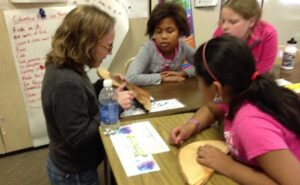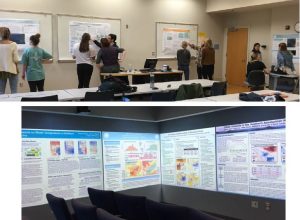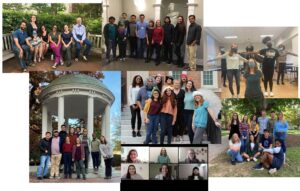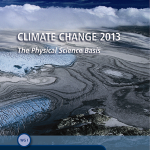Are you interested in Geographic Information Sciences (GISc)? Do you already have a BS or BA? Consider our one-year Graduate Certificate Program in Geographic Information Sciences (GISc) & contact me if you’d like more information.
I am part of the PROGRESS Mentoring Program, aimed at undergraduate students who identify as women and are interested in the earth & environmental sciences. Check out this page if you are interested in finding out more about careers in earth & environmental sciences!
In Spring 2020, I taught a new course, Narrating Climate Change: Making the Global Personal, with Heidi Kim (English & Comparative Literature), as part of UNC’s Integrated Curricula Program! The Integrated Curricula Program aims to integrate the arts and humanities with science.
I was a faculty mentor for an AMAZING group of UNC Johnston Scholars through the UNC Scholars program from their first day to their last at UNC!
I am part of UNC’s Targeting Equity in Access to Mentoring (TEAM) ADVANCE program, aimed at promoting accessible, equitable, and effective mentoring across the University, with emphasis on supporting women in STEM fields.
I am a 2020 graduate of the IMPACTS (Inspiring Meaningful Programs and Communication Through Science), a state-wide public science communication training and outreach initiative through the Morehead Planetarium & Science Center.
At UNC, I have been involved with Project Uplift, a summer program designed to increase access to higher education for high-school seniors, especially those underrepresented in post-secondary education, and the Finish Line Project, designed to ensure more first-generation college students access, persist, and complete post-secondary study.
In the 2015-2016 academic year, I was part of the Greenlaw 101 Interactive Lecture Hall Pilot Study. There is a feature on this in our Geography Spring 2016 Newsletter (p.6).
Below you can find short descriptions of courses I teach regularly; go HERE for all courses currently offered in the UNC-CH Geography Department.
GEOG89: First-Year Seminar & GEOG65H: First-Year Honors Seminar — Climate Change & the Media
Climate change has been called both the “greatest hoax” ever perpetu ated and the “most urgent threat” facing the world. While scientists produce volume after volume of consensus documents on climate change, the popular debate rages on, fueled by print and TV news, social media, movies, and fiction. Experts, pseudo-experts, and casual observers debate causes, consequences, and remedies in every form of media. In this class, we will explore how the established science of climate change is presented, distorted, and debated in the public sphere by alarmists, denialists, and everyone in between. Through reading and writing exercises, class viewings, discussions, and presentations, students will encounter many points of view, explore a variety of media sources, and develop informed perspectives on one of the defining issues of our time. Beyond climate change, the topics discussed in this class will have relevance to other current events where science, politics, and personal beliefs intersect.
ated and the “most urgent threat” facing the world. While scientists produce volume after volume of consensus documents on climate change, the popular debate rages on, fueled by print and TV news, social media, movies, and fiction. Experts, pseudo-experts, and casual observers debate causes, consequences, and remedies in every form of media. In this class, we will explore how the established science of climate change is presented, distorted, and debated in the public sphere by alarmists, denialists, and everyone in between. Through reading and writing exercises, class viewings, discussions, and presentations, students will encounter many points of view, explore a variety of media sources, and develop informed perspectives on one of the defining issues of our time. Beyond climate change, the topics discussed in this class will have relevance to other current events where science, politics, and personal beliefs intersect.
GEOG110: Environmental Systems
 This course provides students with an introduction to physical geography and environmental systems science. We cover the major components of the ‘earth system’ – atmosphere, lithosphere, hydrosphere and biosphere – including regulatory processes, distribution patterns, and impacts of human activity. The class will help students to better understand their natural environment – here in North Carolina, as well as in other locations.
This course provides students with an introduction to physical geography and environmental systems science. We cover the major components of the ‘earth system’ – atmosphere, lithosphere, hydrosphere and biosphere – including regulatory processes, distribution patterns, and impacts of human activity. The class will help students to better understand their natural environment – here in North Carolina, as well as in other locations.
GEOG414: Climate Change
 The Earth’s climate has become front-page news and is at the forefront of scientific inquiry. This course provides a “hands on” introduction to climate change science through a combination of lecture and lab activities. The physical principles governing the Earth’s climate system and variability in the system through time are be covered to provide a solid background in climate science. The course then delves into the scientific basis of climate change and the current state of knowledge concerning future projections and their implications for society and the environment. Lab activities include working with a variety of climate data and climate model output, performing basic analyses, and thinking critically about the results.
The Earth’s climate has become front-page news and is at the forefront of scientific inquiry. This course provides a “hands on” introduction to climate change science through a combination of lecture and lab activities. The physical principles governing the Earth’s climate system and variability in the system through time are be covered to provide a solid background in climate science. The course then delves into the scientific basis of climate change and the current state of knowledge concerning future projections and their implications for society and the environment. Lab activities include working with a variety of climate data and climate model output, performing basic analyses, and thinking critically about the results.
GEOG415: Communicating Important Ideas
If you do important and meaningful work and hope to have an impact on the world, you need other people to not only hear about it, but also to understand,  remember, and care about it! Beyond hoping to change the world, success in any career (and many other facets of life!) requires the ability to communicate effectively. This hands-on course will set you on a path towards making a positive difference in the world through good research practices and effective communication. We’ll start with listening, clarifying your message, and the importance of narrative for the human brain. Then we’ll work on scholarly communication: creating effective graphics, giving engaging oral and poster presentations, and writing abstracts that make people want to read further. Next, we’ll concentrate on other audiences: social media use in research, communication with journalists, operating in the judicial and political arenas, and stakeholder outreach and public talks. Although this course is largely focused on the practical, each week we’ll also cover theoretical issues, such as design theories, how people learn, and communicating in a post-factual world.
remember, and care about it! Beyond hoping to change the world, success in any career (and many other facets of life!) requires the ability to communicate effectively. This hands-on course will set you on a path towards making a positive difference in the world through good research practices and effective communication. We’ll start with listening, clarifying your message, and the importance of narrative for the human brain. Then we’ll work on scholarly communication: creating effective graphics, giving engaging oral and poster presentations, and writing abstracts that make people want to read further. Next, we’ll concentrate on other audiences: social media use in research, communication with journalists, operating in the judicial and political arenas, and stakeholder outreach and public talks. Although this course is largely focused on the practical, each week we’ll also cover theoretical issues, such as design theories, how people learn, and communicating in a post-factual world.
GEOG416: Applied Climatology: The Impacts of Climate & Weather on Environmental and Social Systems
 Climate intersects with society across a wide range of sectors, including agriculture, water resources, air quality, energy, and human health. Applied climatology is interdisciplinary in nature, involving the application of climate data and techniques to solve a wide range of environmental problems. In this projects-based course, we will apply data and techniques to understand how climate impacts environmental and social systems. The course is designed around three modules, which are tied to recent climate events.
Climate intersects with society across a wide range of sectors, including agriculture, water resources, air quality, energy, and human health. Applied climatology is interdisciplinary in nature, involving the application of climate data and techniques to solve a wide range of environmental problems. In this projects-based course, we will apply data and techniques to understand how climate impacts environmental and social systems. The course is designed around three modules, which are tied to recent climate events.
GEOG 416 is a designated Research Intensive Course and meets one of the criteria of the Carolina Research Scholars Program (http://our.unc.edu/students/crsp). Research-intensive courses are defined as classes in which over half of course time is devoted to students conducting original research and presenting research conclusions.
GEOG704: Communicating Geography
 Communicating Geography is a required course for new graduate students in the Department of Geography at UNC. In this course, we will: 1) introduce new graduate students to the discipline of Geography and explore the ways in which geographers approach a wide range of research topics through a focus on current faculty research within the department; 2) help students get started on developing their own research; and 3) enhance the graduate school experience and support future success in graduate school and beyond by working on professional development and communication skills.
Communicating Geography is a required course for new graduate students in the Department of Geography at UNC. In this course, we will: 1) introduce new graduate students to the discipline of Geography and explore the ways in which geographers approach a wide range of research topics through a focus on current faculty research within the department; 2) help students get started on developing their own research; and 3) enhance the graduate school experience and support future success in graduate school and beyond by working on professional development and communication skills.
GEOG801/GEOG811: Seminar in Earth System Science and Biophysical Geography
Fall 2014: Climate Change Consensus: The 2013/2014 Intergovernmental Panel on Climate Change Assessment Report #5 (IPCC AR5)
Spring 2017: Making your research matter: Effective communication and visualization of information
Spring 2018: Climate Change Workshop with King’s College London
Fall 2019: Data Assimilation, Dendrochronology, and Data Processing
